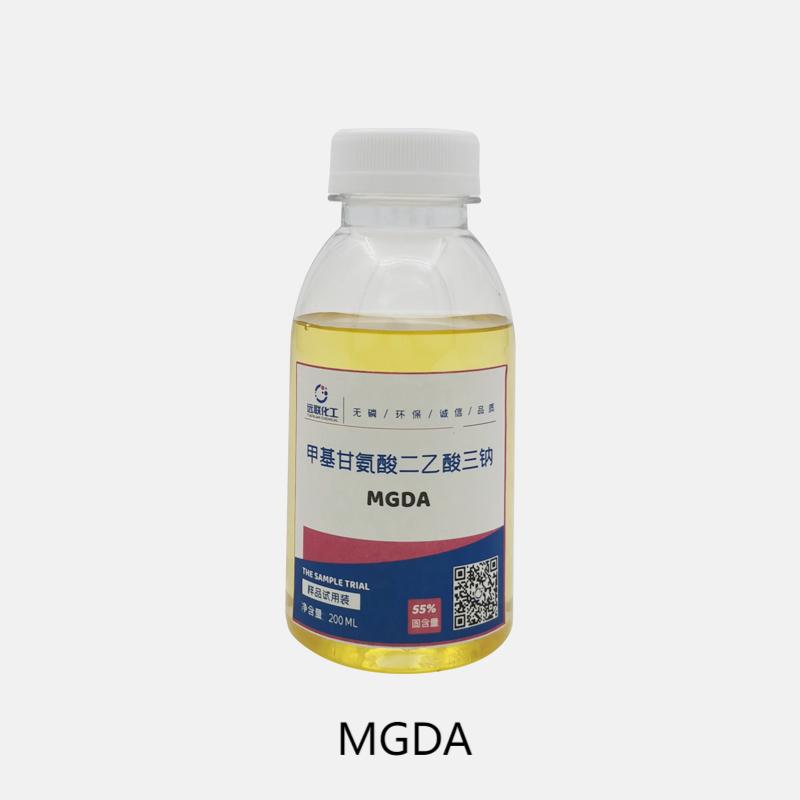
Eco-Friendly MGDA Chelating Agent: The Sustainable Solution for Industrial & Household Use
Introduction: The Need for Green Chelators
In today's world, where environmental sustainability is of paramount importance, the need for eco-friendly alternatives in various industries has become increasingly urgent. Traditional chelating agents like EDTA (ethylene diamine tetraacetic acid) and NTA (nitrilotriacetic acid) have long been used for their ability to bind metal ions, but their environmental impact is a growing concern. These conventional chelators are known to persist in the environment, leading to eco-toxicity challenges such as water pollution and harm to aquatic life. This is where MGDA (methylglycinediacetic acid) steps in as a game-changer. As an eco-friendly chelating agent, MGDA offers a sustainable solution that is both safe and effective, making it a top choice for both industrial and household applications.
What is MGDA? Science Behind the Molecule
MGDA, with its chemical name Methylglycinediacetic Acid, is a biodegradable chelator that has gained significant attention for its environmental benefits. Unlike traditional chelators, MGDA follows a natural degradation pathway that meets the OECD 301 standards, ensuring its rapid breakdown in the environment. This is crucial in reducing its ecological footprint. When compared to phosphates and EDTA, MGDA exhibits significantly lower aquatic toxicity, making it a safer option for water bodies and marine life. Understanding the structure of MGDA is key to appreciating its unique properties as a biodegradable chelator.

Environmental Advantages: Why MGDA Stands Out
3.1 Rapid Biodegradability
One of the most remarkable features of MGDA is its rapid biodegradability. Data shows that MGDA degrades by more than 68% within just 28 days, a stark contrast to EDTA, which degrades by less than 5% in the same period. This rapid degradation means that MGDA does not accumulate in the environment, reducing its long-term impact on ecosystems.
3.2 Non-Bioaccumulative
MGDA is non-bioaccumulative, which is essential for maintaining the health of marine life and soil. Unlike some traditional chelators that can build up in the food chain, MGDA does not pose a risk of bioaccumulation. This ensures that it does not harm aquatic organisms or disrupt the balance of ecosystems.
3.3 Renewable Sourcing
Another significant advantage of MGDA is its renewable sourcing. MGDA is derived from plant-based raw materials, such as sugarcane, making it a sustainable and eco-friendly choice. By using renewable resources, MGDA reduces the reliance on non-renewable materials and contributes to a more sustainable supply chain.
Key Applications of Eco-Friendly MGDA
4.1 Detergents & Cleaners
MGDA is widely used in detergents and cleaners, offering phosphate-free formulations for dishwashing and laundry. It enhances stain removal without causing pollution, making it an ideal choice for environmentally conscious consumers. By using MGDA in detergents, manufacturers can create products that are both effective and sustainable.
4.2 Wastewater Treatment
In the realm of wastewater treatment, MGDA plays a crucial role in removing heavy metals such as lead (Pb) and cadmium (Cd) from industrial effluents. Its ability to chelate these metals effectively ensures that they do not enter water bodies, thereby protecting aquatic life and preventing pollution.
4.3 Personal Care
MGDA is also used in personal care products like shampoos and lotions, where it helps in creating preservative-free formulations. These products are compliant with the EU Ecolabel, ensuring that they meet high standards of environmental and health safety.
Performance vs. Conventional Chelators
When comparing MGDA to conventional chelators like EDTA and GLDA, several key differences emerge. A comparison table highlights the biodegradability, toxicity, cost, and efficiency of these chelators. For instance, MGDA has been shown to have 40% lower algae toxicity than NTA in case studies. This makes MGDA not only a more sustainable choice but also a more effective one in terms of environmental impact.
Certifications & Regulatory Compliance
MGDA has garnered numerous certifications and regulatory approvals, further cementing its status as a reliable and eco-friendly chelating agent. It has received the EU Ecolabel and Nordic Swan certifications, both of which are highly regarded for their stringent environmental standards. Additionally, MGDA has been approved by OECD 301B for biodegradability and has obtained REACH and FDA approval for food-contact uses. These certifications ensure that MGDA meets the highest standards of safety and sustainability.
Future Trends & Market Outlook
The future looks bright for MGDA as demand for eco-friendly solutions continues to rise. In the context of circular economy models, MGDA is poised to play a crucial role in reducing waste and promoting sustainability. Innovations such as nano-chelators for precision agriculture are also on the horizon, further expanding the potential applications of MGDA.
Conclusion: MGDA as a Sustainable Standard
In conclusion, MGDA stands out as a sustainable standard for chelating agents. Its rapid biodegradability, non-bioaccumulative nature, and renewable sourcing make it an ideal choice for a wide range of applications. As industries and consumers alike strive to meet their ESG (Environmental, Social, and Governance) goals, switching to MGDA is a step in the right direction. We encourage everyone to consider the environmental impact of their choices and make the switch to MGDA for a more sustainable future.
Yuanlian Chemical specializes in the production of polyaspartic acid (PASP),tetrasodium iminodisuccinate(IDS), GLDA, MGDA etc. with stable quality and excellent quantity!





Contact us